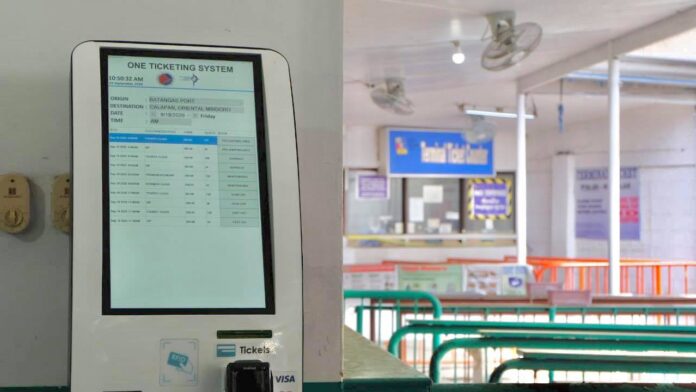
-
The Philippine Inter-Island Shipping Association (PISA) is seeking a review of Philippine Ports Authority (PPA) Administrative Order 12-2019 implementing a central ticketing system (CTS)
-
The group claims CTS is redundant, impractical and an additional cost to the public
-
PPA has no authority to regulate business operations of private shipowners and private port operators, including their mode of ticketing system, they said
-
The order was issued without thorough assessment of its impact and despite strong objections from stakeholders, they added
-
PISA also wants to stop bidding an electronic terminal management system
The Philippine Inter-Island Shipping Association (PISA) is asking the Anti-Red Tape Authority (ARTA) to review a Philippine Ports Authority (PPA) order implementing a central ticketing system (CTS) which it claims is “redundant”, “impractical” and an additional cost to the riding public.
PPA Administrative Order 12-2019 was also “issued without a thorough regulatory impact assessment” and was “strongly objected” to by stakeholders, the group said.
In addition, PISA in a July 12 letter to ARTA director general Jeremiah Belgica, requested ARTA to stop PPA from bidding out an electronic terminal management system (ETMS). The group’s opposition is centered on the system’s unified electronic ticketing feature.
READ: PPA seeks bids for P500M terminal management system
AO 12-2019, issued in November 2019, provides rules on the implementation of PPA’s central ticketing system, an online application procedure that will support an integrated vessel booking and payment system for roll-on/roll-off ports.
READ: PPA rolls out online application rules for vessel booking, payment
The CTS aims to serve as a real-time system with a single window for processing all transactions of government, shipping companies, port terminal operators, passenger terminal building operators, and the general public.
PPA said the project complies with the International Maritime Organization’s mandatory requirement for the electronic exchange of information on cargo, crew, and passengers as part of the revised Convention on Facilitation of International Maritime Traffic.
In September 2020, PPA tested its Unified Electronic Ticketing System, also known as CTS, at the ports of Batangas and Calapan, Mindoro to prepare for the system’s planned full implementation in 2021. In November 2020, a public consultation was conducted to solicit inputs from stakeholders ahead of AO 12-2019’s implementing rules and regulations.
READ: PPA tests online vessel booking, payment system at Ro-ro ports
This July, PPA issued an invitation to bid for the ETMS project that will feature cloud-based unified electronic ticketing capabilities. The ETMS aims to innovate doing business under “new normal” conditions through an online, real-time application that passengers, vessel operators, port service providers, and the ports authority could access “anytime and anywhere.”
PPA will spend P500 million of its 2021 corporate budget for the project, which also includes the system server for the PPA head office and 25 kiosks to be distributed, installed, and configured in PPA ports.
Opening of bids was initially scheduled for July 30 but in a supplemental bid bulletin dated July 19, PPA said submission and opening of bids was postponed until further notice.
No prior hearing
PISA said AO 12-2019 was issued without prior public consultation with affected sectors, a requirement of the Revised Administrative Code of 1987. PISA noted the PPA general manager admitted to this during a virtual event on October 21, 2020.
The association said a public consultation was “held after the fact on November 9, 2020,” with the hearing chaired by PPA assistant general manager for finance and administration Elmer Nonnatus Cadano where “all of the stakeholders present interposed their vehement objections to the proposed system.”
PISA claimed AO 12-2019 is “beyond the powers and authority of the PPA to promulgate”. A cursory reading of Presidential Decree 857 (PPA Charter), which was cited as basis for the AO, shows PPA has no authority to control, manage, or regulate the ticketing system of private shipowners or private port operators, the association said.
“While PPA is vested with authority and jurisdiction over the ports and port districts, it does not have any authority to regulate the business operations including the mode of ticketing system of private shipowners and private port operators,” PISA added.
Moreover, AO 12-2019 “constitutes undue delegation of power, is oppressive and confiscatory.”
The group also noted Paragraph 4 (44) of AO 12-2019 states that “subject to the terms and conditions, including the service costs agreed between PPA and its designated service provider…”
PISA said any expense relating to the CTS, including service costs and added administrative fee, would certainly form part of the integrated shipping fare.
“Therefore, the determination of the service costs, and ultimately, the shipping rates or fares, will be left solely at the discretion of the PPA and the designated service provider,” the group pointed out.
Unlawful infringement
PISA said AO 12-2019 “constitutes an unlawful government intrusion to private business operations and an infringement to management or business prerogatives of the private shipowners and/or port operators.”
The group noted the ticketing system is an integral part of the business operations of private shipowners and private port operators.
PISA said: “Stakeholders in the private sector have designed and developed their own ticketing system that is convenient and practical based on what their operations demand, what their patronizers need, and what their business can afford, without violating any law, rule, or regulation. The assailed AO unduly intrudes on the private operators’ conduct of their respective business affairs.”
Further, PISA said the objectives set forth in AO 12-2019 “cannot be addressed by a unified ticketing system.”
It argued shipowners are already providing ticketing systems “at no cost to the government.” It said the proposed system cannot curb the presence of fixers and scalpers inside and outside the vicinity of the ports, and that overloading issues are already being addressed by vessel inspection and physical headcount conducted by the Philippine Coast Guard among passengers boarding ships prior to departure.
PISA said maritime transport stakeholders have noted no such system is prescribed for land and air transport. – Roumina Pablo




